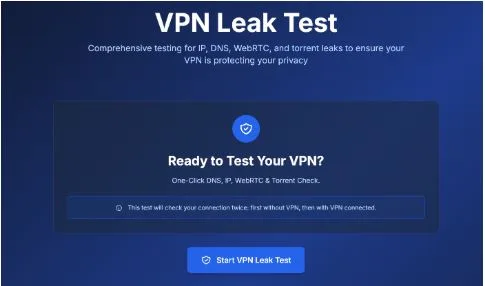How to Test a VPN Connection?
Your VPN might be lying to you. Many people think they’re safe just because they see a VPN icon in their system tray. Reality check: VPN services fail more often than users realize.
Why Your VPN Might Not Work
Connections break. Software bugs happen. Sometimes your real information slips through cracks you never knew existed.
IP address exposure represents the biggest threat. Your actual location becomes visible to websites despite running VPN software. DNS problems create another headache. Your internet provider still sees which websites you visit. WebRTC issues plague most browsers. These vulnerabilities bypass VPN protection completely.
Torrent users face additional risks. File-sharing programs often ignore VPN settings. Copyright trolls monitor these direct connections.
The Testing Method That Actually Works
Testing requires comparing two different connection states. Check your information without VPN first. Connect your VPN service next. Compare what changed between both tests.
Start fresh. Disconnect your VPN completely. Close your browser and restart it. This eliminates cached data that could skew results. Write down your actual IP address and location. Note which DNS servers appear in your connection details.
Turn on your VPN now. Pick any server location you prefer. Wait thirty seconds for the connection to stabilize. Gather the same information again. The differences tell you everything.
Automated Testing Made Simple
Manual testing takes forever and breeds mistakes. Smart testing platforms handle both steps automatically. VPN Leak Test runs comprehensive checks without requiring technical knowledge.
This service scans for multiple vulnerability types simultaneously. DNS leaks get detected instantly. IP exposure shows up immediately. WebRTC problems become obvious. Torrent security gets evaluated thoroughly.
The system works regardless of your current connection status. Visit the site with VPN off or on. Results appear within seconds. No manual comparison needed.
What Good Results Look Like
Successful VPN operation changes everything about your connection fingerprint. Your IP address should match the server location you selected. Geographic data should reflect the VPN endpoint, not your home.
DNS servers must belong to your VPN provider. Your internet service provider’s DNS should disappear completely. WebRTC tests should show no traces of your real IP. Torrent connections should route through encrypted tunnels only.
Warning Signs to Watch For
Bad results reveal themselves quickly. Same IP address appearing before and after connection means total failure. Your ISP’s DNS servers still showing up indicates serious problems.
WebRTC displaying your actual location spells trouble. Torrent traffic bypassing VPN protection creates legal risks. Any of these issues demand immediate attention.
When to Run Tests
Regular testing prevents nasty surprises. Software updates sometimes break VPN functionality. New device setups need verification. Different networks affect VPN behavior unpredictably.
Airport WiFi might cause issues your home connection doesn’t show. Hotel internet often blocks VPN traffic. Coffee shop networks create their own problems.
Test after changing VPN servers too. Different locations use different infrastructure. What works in New York might fail in Tokyo.
Quick Troubleshooting Tips
Problems have solutions. Switch to different VPN protocols if available. OpenVPN often works where others fail. Change DNS settings manually if needed.
Kill switches prevent accidental exposure. Enable this feature in your VPN client. Browser extensions sometimes conflict with main VPN software. Disable them temporarily during testing.
Router-level VPN provides better protection than software clients. Consider upgrading if leaks persist across multiple devices.
The Bottom Line
VPN testing isn’t optional anymore. Privacy breaches cost more than time spent on verification. Five minutes of testing beats months of wondering whether your data stayed private.
Trust requires verification. Marketing promises mean nothing without proof. Your VPN provider wants your money, not necessarily your security.
Run tests monthly at minimum. Document results for future reference. Change providers if problems persist. Your privacy deserves working protection, not false promises.
Remember this simple truth: untested VPNs provide untested security. Would you drive a car without checking the brakes? Your digital safety deserves the same attention.




